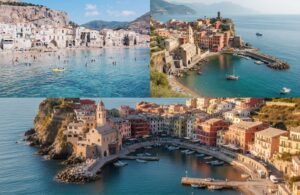Need to know what do I need to travel to Italy? This guide outlines the essentials like passports, visas, and travel insurance, ensuring you’re fully prepared. Keep reading for a hassle-free travel experience.
Key Takeaways
- Ensure your passport is valid for at least three months beyond your departure date to avoid denied entry to Italy.
- Visa-free travel is available for many nationalities for up to 90 days, but check specific requirements for your country in advance.
- From 2025, travelers from visa-exempt countries must obtain ETIAS authorization to enter Italy, ensuring compliance with travel regulations.
Valid Passport

A valid passport is your golden ticket to Italy. Your passport must be valid for at least three months after your planned departure date. Ensuring this validity is crucial for travel. For example, if you’re planning to leave Italy on December 1st, your passport should be valid until at least March 1st. Failing to meet this requirement could result in denied entry at the border, turning your dream vacation into a nightmare.
Moreover, entry into Italy from a non-Schengen country requires a passport stamp. This stamp is a necessary formality to keep track of your stay duration. Not having this stamp could cause issues during your departure or any future visits to Schengen countries, as it serves as proof of your legal entry.
Before finalizing your travel plans, make sure your passports are up to date and meet all the necessary passport requirements. This small step can save you a lot of hassle and ensure a smooth entry when traveling to Italy.
Visa Requirements

Knowing visa requirements ensures hassle-free travel. Fortunately, many travelers can enjoy visa-free travel to Italy for up to 90 days. This includes citizens from the U.S. and Canada, who can enter Italy for tourism or business without needing a visa for up to 90 days. This ease simplifies short-term visits for those from countries with visa waiver agreements.
However, not all travelers are this lucky. Different visa requirements apply to citizens of other countries, including certain countries. Check the specific entry requirements based on your nationality well in advance. Some countries require more stringent documentation, and the application process can be time-consuming.
For EU citizens, travel to Italy is even simpler. Being part of the European Union, they do not need a visa to enter Italy, allowing for seamless travel across member countries. Double-check current visa requirements as they can change, and ensure all your travel documents are in order before your journey.
ETIAS Authorization
From 2025, travelers from visa-exempt EU countries must secure a travel authorization ETIAS authorization before entering Italy. ETIAS, the European Travel Information and Authorization System, is designed to screen travelers for security purposes. The application process is straightforward and typically takes about 10 to 15 minutes; providing accurate personal information helps avoid delays.
The ETIAS authorization lasts for three years. It will expire sooner if your passport expires before the three years are up. This means you won’t need to reapply for each trip to Italy within that period, making it a convenient option for frequent travelers. Certain conditions, like serious criminal convictions or providing false information during the application, can affect your eligibility.
Obtaining your ETIAS visa waiver is a crucial step in your travel plans. This small task provides peace of mind, ensuring smooth entry into Italy without unexpected complications. Complete your ETIAS application well before departure to avoid last-minute issues.
Travel Insurance

Travel insurance is a vital part of your travel plans. It covers unforeseen events like medical emergencies, trip cancellations, and lost luggage, providing a financial safety net for your trips. Imagine falling ill or facing a canceled flight without coverage; the costs can quickly add up, turning your dream vacation into a costly ordeal.
Comprehensive travel insurance should cover medical expenses, trip cancellations, and lost luggage. Medical evacuation coverage is particularly important, as an airlift from a rural area to a better-equipped hospital can cost upwards of $50,000. When choosing travel insurance, consider factors like your age, existing health conditions, and travel specifics to ensure the best coverage.
Purchasing travel insurance is a minor expense compared to potential costs of medical emergencies or other unforeseen events. It ensures you can travel to Italy with peace of mind, knowing you are protected against the unexpected.
International Driver’s Permit (IDP)
An International Driver’s Permit (IDP) is essential if you plan on driving in Italy. Alongside your local driver’s license, the IDP allows you to legally drive and rent a car. Without it, you risk hefty fines over €300 and invalidate any rental car insurance.
Applying for an IDP is straightforward and can be done at your local automobile association. Obtain your IDP before you travel, as it cannot be issued abroad.
Having both your IDP and local driver’s license ensures that you can enjoy the flexibility and convenience of driving through Italy’s beautiful landscapes.
Medical Prescriptions and Health Precautions
Health preparations are crucial for your travel plans. Make sure your routine vaccinations are up to date and consult a travel healthcare provider about any additional vaccines or medications needed. Carrying a comprehensive travel health kit, including necessary medications for common ailments, is advisable, and knowing when to seek medical attention is essential.
Travelers can bring up to a 30-day prescription into Italy, but verifying the legality of these medications before traveling is crucial. Carry copies of medical prescriptions and necessary medications to avoid issues with customs or local authorities.
Health services in rural areas can be limited, so be prepared, especially if exploring less urban regions. Consulting a healthcare provider about potential health risks specific to the regions of Italy you plan to visit ensures you stay healthy throughout your trip.
Declaration of Presence
Non-EU citizens staying in Italy for less than 90 days must report their presence to the local police office within eight days of arrival. This involves filling out a declaration of presence form, known as dichiarazione di presenza.
Failure to submit this form can lead to severe consequences, including expulsion from the country. Completing this entry requirement promptly upon arrival helps you avoid legal issues during your stay.
Financial Proof and Return Ticket
Italian authorities may require proof of sufficient funds to pay and a return or onward ticket upon entry, as mandated by the italian ministry and the italian government. This documentation shows you have the means to support yourself during your stay and plans to leave the country after your visit.
If carrying more than 10,000 Euros, you must declare this amount upon entry. While proof of sufficient funds is not generally mandatory, having this documentation can ensure a smoother entry process and avoid potential issues with customs officials.
Double-check your travel plans and ensure you have all necessary documentation required for safe travels before departure.
Important Documents

Keep both digital and physical copies of your important travel documents for a stress free experience trip. This includes your valid passport, ETIAS authorization, travel insurance policy, and hotel reservations. Having these documents easily accessible can save time and hassle in unexpected situations.
Non-EU visitors must obtain a passport stamp upon initial entry into a Schengen area country. This stamp serves as proof of your legal entry into a Schengen area country and should be kept safe.
Have a current email address ready to receive updates regarding your ETIAS application and other important correct information. Keeping your documentation up to date and organized ensures you’re well-prepared for any situation during your travels, including understanding the etias requirements.
True Colors of Italy Can Help

To truly experience Italy, blend in with the locals by dressing in neutral colors and stylish outfits, as fashion is highly regarded. Choose family-owned restaurants over touristy spots to enjoy authentic dining experiences and better interactions with locals. If you want to immerse yourself fully, be sure to visit Italy.
Engage fully with your surroundings and respect local customs, like the coffee culture or dress codes at religious sites. This enhances your travel experience and helps you connect more deeply with Italy’s rich culture. Learning a few Italian phrases can greatly improve your interactions with locals and show your appreciation for their culture.
Summary
In summary, preparing for a trip to Italy involves several important steps, from securing a valid passport and understanding visa requirements to obtaining an ETIAS authorization and travel insurance. Ensuring you have all necessary travel documents, including an International Driver’s Permit and medical prescriptions, will help you navigate the intricacies of Italian travel regulations smoothly.
As you embark on this exciting journey, remember to immerse yourself in the local culture, respect customs, and enjoy every moment. With careful planning and preparation, your Italian adventure will be a memorable and enriching experience. Buon viaggio!
Frequently Asked Questions
Do I need a visa to travel to Italy?
Most travelers, including U.S. and Canadian citizens, can visit Italy visa-free for up to 90 days, but citizens from certain countries will require a visa. Always check your specific requirements before planning your trip.
What is ETIAS and do I need it for my trip to Italy?
ETIAS, or the European Travel Information and Authorization System, will be required for travelers from visa-exempt countries visiting Italy starting in 2025. Therefore, you will need to obtain ETIAS for your trip to Italy if you fall into that category.
Why is it important to have travel insurance for my trip to Italy?
Having travel insurance for your trip to Italy is essential because it protects you from unexpected events like medical emergencies, trip cancellations, and lost luggage, ensuring you won’t face significant financial burdens.
Can I drive in Italy with my local driver’s license?
You can drive in Italy, but you must also have an International Driver’s Permit (IDP) alongside your local driver’s license to avoid fines and ensure valid rental car insurance.
What should I do if I need to bring prescription medications to Italy?
You should carry a copy of your medical prescriptions and ensure that your medications are legal in Italy, as you can bring a supply for up to 30 days. This will help avoid any issues during your travels.












